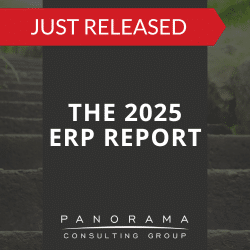One type of software we should probably talk more about is human resources (HR) software.
Software within this category includes everything from human resource information systems to human capital management systems. These systems streamline HR processes, enhance employee engagement, and drive informed decision-making.
Understanding the advantages of HR software is critical to leveraging it as a tool for growth and transformation.
Today, we’re detailing the benefits of HR software and exploring how integrated solutions, like ERP systems with HR functionality, can increase productivity and help you achieve your business goals.
Types of HR Software
- Human Resource Information System (HRIS) – This is a comprehensive platform for managing employee data, payroll, benefits, and compliance. Key features include employee records management, payroll processing, benefits administration, compliance tracking, and reporting.
- Human Capital Management (HCM) System – This encompasses a broad range of HR functions, integrating talent management, workforce planning, and analytics. Features include talent acquisition / development / retention, workforce analytics, succession planning, strategic workforce planning, and performance management.
- Human Resource Management System (HRMS) – This software combines the functionalities of HRIS and HCM, offering a comprehensive suite of HR capabilities. Features include payroll and benefits administration, time and attendance tracking, recruitment, performance management, learning and development, and employee self-service portals.
2025 Clash of the Titans
SAP, Oracle, Microsoft, and Infor each have a variety of systems that can support data-driven decision-making. We surveyed customers of these four vendors to find out what their selection and implementation process was like.
The Benefits and Advantages of HR Software
1. Efficient Talent Acquisition
One of the most significant benefits of HR software is its ability to streamline the recruitment process.
Automated applicant tracking allows HR teams to efficiently manage the entire hiring lifecycle, from posting job vacancies to shortlisting candidates. This not only saves time but also ensures a more organized and fair selection process, leading to better hires and reduced time-to-fill metrics.
(Learn about the importance of HR transformation.)
2. Enhanced Candidate Experience
HR management systems improve the candidate experience by providing a more seamless and engaging application process. Features like self-service portals and automated communication keep candidates informed and engaged.
A positive candidate experience is crucial for attracting top talent, as it reflects the organization’s culture and values.
3. Accelerated Onboarding
The onboarding process is a critical time for new hires, and HR software simplifies this phase by automating paperwork and providing structured training modules. Employees can access training materials, complete necessary documentation, and connect with team members through a single platform, ensuring a smooth transition into the organization.
4. Performance Management Tools
HR software offers performance management tools that enable managers to set clear goals, provide continuous feedback, and conduct regular performance reviews. This helps align individual objectives with organizational goals, fostering a culture of accountability and growth.
5. Employee Self-Service
HR software empowers employees with self-service capabilities, allowing them to access their personal information, request leave, and manage benefits online. This reduces administrative burdens on HR staff and gives employees greater control over work-related matters.
6. Comprehensive Analytics
Many HR systems provide powerful analytics capabilities, enabling organizations to make data-driven decisions. By tracking key metrics such as turnover rates and employee satisfaction, HR leaders can identify trends, predict future needs, and develop strategies to optimize talent management.
7. Personalized Learning Paths
HR software offers tailored training modules and career development plans. Employees can access courses that align with their career goals, fostering continuous growth and skill enhancement.
According to recent Gallup research, organizations that invested in employee development saw 11% greater profitability and were twice as likely to retain employees.
8. Enhanced Communication
HR technology offers tools such as instant messaging, video conferencing, and collaboration platforms that enhance communication and connectivity. This not only breaks down silos but it supports flexible work arrangements by providing tools for remote work, time tracking, and virtual collaboration.
The Benefits of ERP Software with HR Functionality
Enterprise resource planning (ERP) software is comprehensive technology that includes functionality for a variety of business areas. One of these areas is human resources.
Instead of implementing a standalone HR system, many organizations choose to implement ERP software to streamline their HR processes in addition to their other business processes.
Depending on your organization’s size and complexity, there may be many advantages to this approach. These include:
1. Integrated Business Processes
ERP software integrates HR processes with core business functions, such as finance, supply chain management, and customer relationship management.
This centralizes data management, while ensuring organizational alignment. All departments have access to accurate and up-to-date information, reducing the risk of errors and improving decision-making.
2. Enhanced Visibility and Control
With centralized data comes enhanced data insights. By analyzing data from across the organization, HR professionals can optimize talent management strategies and make informed decisions to ensure the workforce contributes effectively to the company’s goals.
3. Reduced IT Complexity
A single integrated system can reduce IT complexity and streamline system management. This leads to lower maintenance costs and improved system performance.
One of our project recovery engagements involved an assessment of a human resources management system (HRMS) implementation. The system was standalone, and the software version was too old to fully integrate with the necessary systems. Ultimately, our enterprise software consultants helped the client replace the HRMS with an HCM system that had more integration capabilities.
4. Cross-Functional Collaboration
ERP software fosters cross-functional collaboration by providing a unified platform for data sharing and communication.
For example, throughout recruitment and onboarding, the HR department can easily coordinate with IT, finance, and department managers through the ERP system. This ensures that new hires have a smooth and efficient onboarding experience.
Realizing the Benefits of HR Software
To fully realize the benefits of HR software, it’s crucial to follow a structured approach. This will help you avoid common pitfalls that can hinder implementation and usage.
Here are some best practices that our business software consultants typically focus on:
- Understanding Your Needs – Engage key stakeholders from various departments to identify pain points and gather business requirements.
- Developing a Data Strategy – Determine the key performance indicators (KPIs) you need to track to achieve your corporate objectives. Then, determine what types of data you need your HR software to provide.
- Choosing the Right Vendor – Evaluate potential vendors based on your needs and the vendor’s software functionality, scalability, and integration capabilities.
- Prioritizing Change Management – Communicate the benefits of the new system to employees, provide adequate training, and offer continuous support to address resistance.
- Continuing to Optimize Post-Implementation – Continuously monitor the system’s performance and gather feedback from users. Use analytics to track key metrics and identify areas for improvement.
Learn More About HR Technology Advantages
The benefits of HR software extend beyond the human resources department, offering advantages that impact every aspect of your organization. These benefits are further enhanced when you implement an ERP system with integrated HR functionality.
Contact our independent ERP consultants below to discuss how HR automation might fit into your business strategy.













